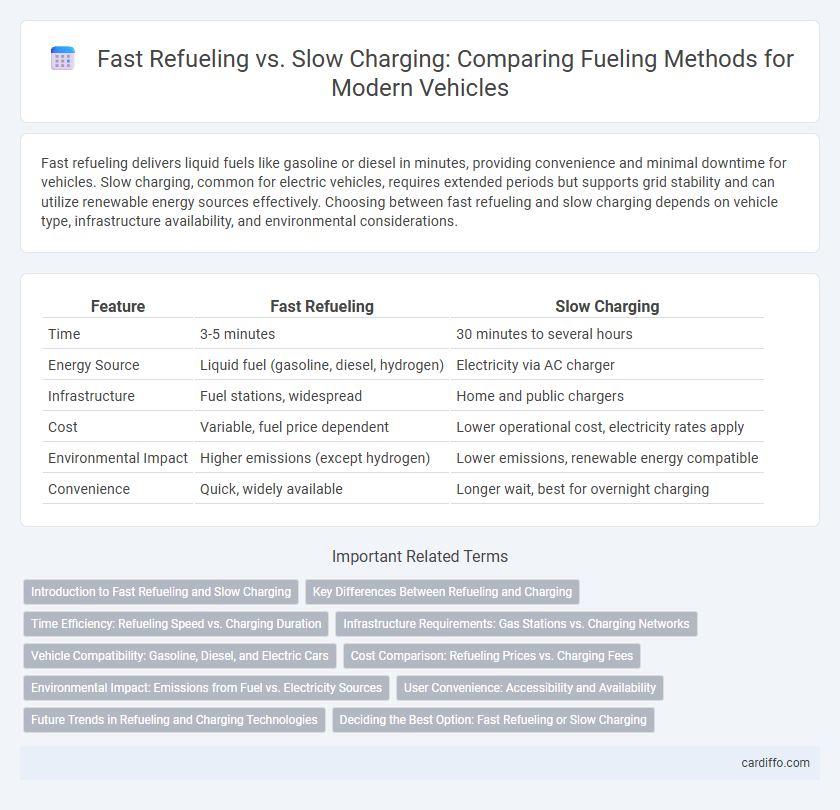Fast refueling delivers liquid fuels like gasoline or diesel in minutes, providing convenience and minimal downtime for vehicles. Slow charging, common for electric vehicles, requires extended periods but supports grid stability and can utilize renewable energy sources effectively. Choosing between fast refueling and slow charging depends on vehicle type, infrastructure availability, and environmental considerations.
Table of Comparison
| Feature | Fast Refueling | Slow Charging |
|---|---|---|
| Time | 3-5 minutes | 30 minutes to several hours |
| Energy Source | Liquid fuel (gasoline, diesel, hydrogen) | Electricity via AC charger |
| Infrastructure | Fuel stations, widespread | Home and public chargers |
| Cost | Variable, fuel price dependent | Lower operational cost, electricity rates apply |
| Environmental Impact | Higher emissions (except hydrogen) | Lower emissions, renewable energy compatible |
| Convenience | Quick, widely available | Longer wait, best for overnight charging |
Introduction to Fast Refueling and Slow Charging
Fast refueling provides a rapid method to replenish fuel or energy, significantly reducing downtime compared to traditional slow charging methods. It is commonly used in fuel stations for liquid fuels like gasoline and diesel, as well as emerging hydrogen fueling stations, enabling vehicles to resume operation within minutes. Slow charging, generally associated with electric vehicles, involves gradual energy transfer over extended time periods, ideal for overnight or off-peak charging but less suited for quick turnarounds.
Key Differences Between Refueling and Charging
Fast refueling typically takes under five minutes, delivering high energy density fuels like gasoline or diesel, which allows vehicles to resume operation quickly. Slow charging for electric vehicles can take several hours due to lower power transfer rates and battery capacity limitations, impacting overall convenience and usability. Energy storage differences, infrastructure availability, and environmental impacts also distinguish refueling from charging processes in modern transportation.
Time Efficiency: Refueling Speed vs. Charging Duration
Fast refueling delivers fuel in minutes, typically under five, enabling rapid vehicle turnaround compared to slow charging, which may require several hours to replenish electric vehicle batteries fully. Time efficiency strongly favors fast refueling, especially for long-distance travel and commercial fleets where minimizing downtime is critical. While slow charging suits overnight or extended parking periods, fast refueling outperforms in scenarios demanding quick energy replenishment with minimal disruption.
Infrastructure Requirements: Gas Stations vs. Charging Networks
Gas stations require extensive infrastructure including fuel storage tanks, pumps, and delivery logistics to support fast refueling of internal combustion engine vehicles. Charging networks demand a widespread installation of electric vehicle chargers, robust electrical grid capacity, and smart grid technology to enable slow charging over longer periods. The scalability and distribution of charging stations remain critical challenges compared to the well-established fuel station infrastructure.
Vehicle Compatibility: Gasoline, Diesel, and Electric Cars
Gasoline and diesel vehicles benefit from fast refueling stations, delivering full tanks in minutes, ensuring compatibility with current infrastructure and long-distance travel needs. Electric cars support both fast and slow charging, but fast chargers require compatible battery management systems to prevent damage and optimize charge time. Vehicle compatibility depends on fuel type and refueling technology, with gasoline and diesel vehicles relying on fuel pumps and electric cars needing specific charging standards like CCS or CHAdeMO.
Cost Comparison: Refueling Prices vs. Charging Fees
Fast refueling typically costs less per minute compared to slow charging due to lower infrastructure and operational expenses. Gasoline and diesel prices remain relatively stable with regional variations averaging $3 to $4 per gallon, while electric vehicle (EV) charging fees fluctuate based on time of use, location, and electricity rates, ranging from $0.10 to $0.30 per kWh. Over time, the total cost of ownership favors EVs with slow charging, as lower energy costs and maintenance compensate for higher initial charging fees.
Environmental Impact: Emissions from Fuel vs. Electricity Sources
Fast refueling of gasoline vehicles emits significant greenhouse gases and pollutants directly from combustion engines, contributing to air quality degradation. Slow charging of electric vehicles offers lower emissions when powered by renewable energy sources but may still rely on fossil-fuel-based electricity grids, affecting the overall environmental footprint. Lifecycle assessments reveal that electric vehicle charging results in significantly reduced carbon emissions compared to traditional fuel combustion, especially in regions with clean energy infrastructure.
User Convenience: Accessibility and Availability
Fast refueling stations are widely accessible, offering quick and convenient energy replenishment for drivers, minimizing wait times and allowing for seamless travel. Slow charging requires longer periods connected to a power source, often limiting availability to home or designated public chargers, reducing flexibility for users on the go. The widespread infrastructure for fast refueling enhances user convenience by providing rapid service and increased accessibility compared to slower charging options.
Future Trends in Refueling and Charging Technologies
Emerging technologies in fast refueling and slow charging are transforming the energy sector, with hydrogen fuel cells enabling ultra-fast refueling times comparable to gasoline stations. Solid-state batteries and advanced charging infrastructure are enhancing slow charging efficiency, supporting overnight and smart grid integrations. Future trends prioritize reducing environmental impact through renewable energy sources and improving battery energy density to extend electric vehicle range.
Deciding the Best Option: Fast Refueling or Slow Charging
Fast refueling offers a significant advantage in time efficiency, typically taking under 10 minutes to fill a vehicle's tank with gasoline or diesel, making it ideal for long-distance travel and commercial fleets. Slow charging electric vehicles, while more environmentally friendly, often requires several hours to reach full capacity, presenting challenges for drivers without access to rapid charging infrastructure. Choosing between fast refueling and slow charging depends largely on the availability of fuel stations, the urgency of usage, and the overall environmental goals of the driver or fleet operator.
Fast Refueling vs Slow Charging Infographic

 cardiffo.com
cardiffo.com